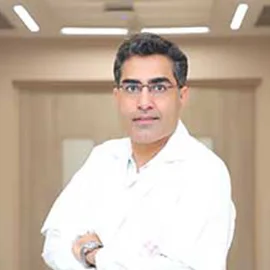- Home
- /
- Treatments
- /
- Rhinoplasty Surgery in Gurgaon
What is Rhinoplasty?
Surgically improving the nose's look or functionality is the goal of rhinoplasty, also referred to as a "nose job." It addresses complications such as deviated septum, breathing difficulties, and aesthetic concerns. If you're considering a rhinoplasty, reach out to us, or book a direct appointment with our plastic surgeon. At the CK Birla Hospital, we are dedicated to ensuring that your rhinoplasty is as safe, comfortable, and effective as possible. We're here to guide you every step of the way toward a successful recovery.
Rhinoplasty: Risks, Types and Cost

What are the Risks if a Rhinoplasty is not done Timely and Properly?
Delaying or improperly performing rhinoplasty can pose risks, like:
- Functional Issues: Exacerbation of breathing difficulties or structural problems.
- Psychological Impact: Prolonged dissatisfaction and self-consciousness.
- Increased Complexity: Worsening of existing issues, necessitating more extensive surgery.
- Scar Tissue Formation: Accumulation of scar tissue complicating outcomes.
- Risk of Complications: Infections, bleeding, anaesthesia issues, and poor healing.
- Unsatisfactory Results: Aesthetic irregularities or asymmetry.
- Long-term Nasal Function Impact: Chronic congestion, breathing difficulties, or collapse.
Consultation with a plastic surgeon assesses concerns, timing, risks, and benefits. Early intervention and technique are crucial for optimal results.
What are the Types of Rhinoplasty?
Rhinoplasty operations are mostly of two types:
Open Rhinoplasty
- Involves major nose reshaping.
- The surgeon makes incisions to separate nose skin from bone and cartilage.
- Provides a clear view of underlying nasal anatomy.
Closed Rhinoplasty
- Minor nose reshaping procedure.
- The surgeon makes incisions within the nose to reshape bone and cartilage.
Other types of rhinoplasty include:
Cosmetic rhinoplasty –
- Enhances nose and facial appearance.
Nonsurgical rhinoplasty (filler rhinoplasty)
- Temporarily fills up imperfections and dips using dermal fillers.
- Can lift a droopy nasal tip or correct small bumps.
Functional Rhinoplasty
- Restores nasal form and function post-disease or trauma.
- Corrects congenital defects and deviated septum.
Secondary Rhinoplasty
- Corrects problems after initial surgery, often complex repairs.
What is the Average Cost of a Rhinoplasty?
The cost of a rhinoplasty varies as per the specific type advised by a healthcare provider, such as:
- Open rhinoplasty
- Closed rhinoplasty
- Cosmetic rhinoplasty
- Nonsurgical rhinoplasty (filler rhinoplasty)
- Functional rhinoplasty
- Secondary rhinoplasty
The cost can also vary widely depending on several factors, including the location, the extent of the procedure, the surgeon’s experience, and the hospital’s pricing structure.
To get an explicit estimate for the cost of rhinoplasty at the CK Birla Hospital, contact the hospital directly. Additionally, you can consult with our board-certified plastic surgeon to discuss your specific needs and receive a personalised quote for the procedure.
What is the Diagnosis before a Rhinoplasty?
The diagnosis before rhinoplasty involves several components, such as:
- Patient Evaluation: Assess overall health, medical history, and pre-existing conditions.
- Nasal Examination: Evaluate external and internal nasal anatomy for functional and aesthetic concerns.
- Goals Discussion: Understand the patient’s desired outcomes and aesthetic preferences.
- Medical Imaging: Obtain X-rays or CT scans for detailed nasal anatomy assessment.
- Diagnosis and Treatment Plan: Formulate a tailored plan addressing functional and aesthetic issues.
- Informed Consent: Explain procedure details, and risks, and obtain patient’s agreement.
Top Plastic Surgeon In Gurgaon

What are the Pre-treatment/surgery Instructions for a Rhinoplasty?
Before rhinoplasty, patients get pre-treatment instructions from surgeons. Guidelines may vary based on medical history and surgeon preferences, however here are some common guidelines:- Undergo a medical evaluation.
- Disclose all medications and supplements.
- Quit smoking and limit alcohol consumption.
- Avoid certain medications and supplements that increase bleeding risk.
- Wash your face and hair with a gentle cleanser.
- Fast starting at midnight before surgery.
- Make travel arrangements for the surgery facility and back.
- Make plans to help with everyday duties while you're recovering.
- Schedule follow-up appointments with the surgeon.
What are the Post-surgery Instructions for a Rhinoplasty?
Post-surgery instructions for rhinoplasty, commonly known as a nose job, encompass various aspects crucial for optimal recovery:- Follow the Surgeon's Advice: Specific instructions tailored by your surgeon are paramount for your unique situation.
- Rest and Recovery: Initial days post-surgery require ample rest, avoiding strenuous activities and heavy lifting.
- Medications: Adhere to prescribed pain relievers and antibiotics to manage discomfort and prevent infection.
- Swelling and Bruising: Apply cold compresses to alleviate common swelling and bruising around the nose and eyes.
- Nasal Care: Follow the provided instructions for nasal cleansing using saline solution or prescribed nasal spray.
- Avoid Certain Activities: Refrain from activities risking nose injury, like contact sports or swimming.
- Elevate Your Head: Maintain head elevation, even while sleeping, to aid in swelling reduction.
- Follow-up Appointments: Attend all scheduled follow-ups to monitor healing progress.
- Diet: Opt for a balanced diet, avoiding difficult-to-chew foods.
- Avoid Smoking and Alcohol: Both can impede healing and heighten complications.
- Patience: Full results may take weeks to months to manifest fully.
How do You Recover after a Rhinoplasty?
Recovering from rhinoplasty involves adhering to specific guidelines:- Follow post-operative instructions diligently.
- Take time off for rest and elevation.
- Manage pain with prescribed medication.
- Apply cold compresses to reduce swelling.
- Expect common side effects like swelling and bruising.
- Nasal packing and splints support healing.
- Avoid strenuous activities and trauma to the nose.
- Attend follow-up appointments for monitoring and guidance.
- Maintain a healthy lifestyle for optimal healing.
- Be patient; final results may take weeks to months.
Be a super-mom, stay informed about pregnancy health updates with our weekly newsletter
[contact-form-7 id=”16292″ title=”Subscribe”]
FAQs Around Rhinoplasty
Who is a Good Candidate for Rhinoplasty?
A good candidate for rhinoplasty desires aesthetic or functional improvement of the nose is in good physical and mental health, and has realistic expectations about the outcomes of the procedure.
What are the Common Reasons People Undergo Rhinoplasty?
Some common reasons as to why people undergo rhinoplasty include correcting nasal asymmetry, improving nasal shape or size, enhancing breathing function, addressing nasal trauma, and refining the overall appearance of the nose.
How is Rhinoplasty Performed?
Rhinoplasty is typically performed under general anaesthesia, involving either open or closed techniques. Surgeons reshape the nasal bones and cartilage to achieve desired aesthetic or functional results.
How Long does it Take to See a Rhinoplasty's Full Outcome?
While initial results of rhinoplasty are noticeable within a few weeks, full recovery and final results may take up to a year as swelling subsides and tissues settle.



